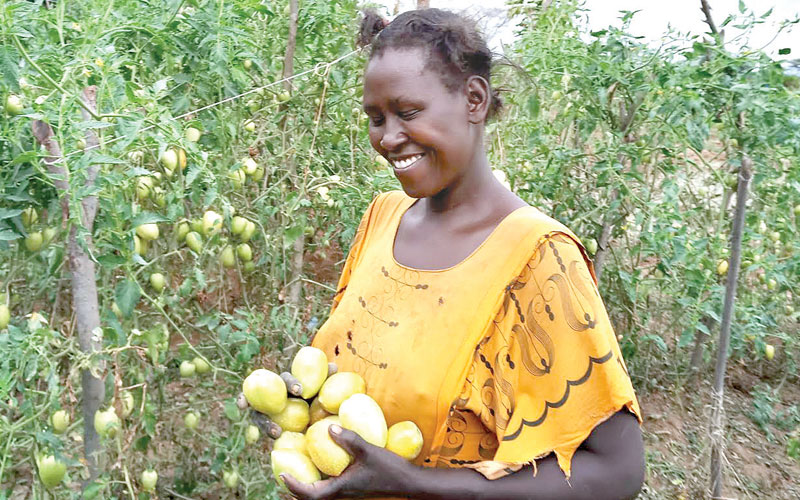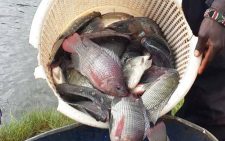Crop ‘bug’ injects hope into Turkana pastoralists

In the remote area of Katilu, Turkana South, along the banks of Turkwel River, Hannah Adung admires her bumper tomato harvest. She is one of those who ditched livestock after returns from animal sales tumbled.
“The Pokots stole our animals and then drought wiped out the remaining livestock. Severe food shortage hit our homesteads and malnutrition exploded in children forcing us to shift into a different kind of farming,” says Adung, who engages in small scale farrow irrigation farming on a one-acre piece of land.
Before venturing into crop farming, the mother of seven had tried her hand at charcoal business and failed.
Adung is one of the more than 2,000 farmers who have taken up farming in Katilu and Turkwel wards to eke out a living in the expansive drought prone county.
On either side of Turkwel River, sugarcane, green grams, bananas and watermelons dot the farms.
Raphael Arem, a pastor, is also embraced crop farming along the river for a decade.
Hard economic times in the dry county drove him to secure a half acre land to grow maize. “I have to juggle between serving the church and finding time to grow crops to save my family from getting trapped in a vicious circle of poverty and malnutrition,” he says.
However, efforts to grow sufficient food is being hampered by lack of access to market, pest menace and lack of chemicals. “Not all crops do well, and spraying is expensive,” he says. He earns a profit of Sh7,000 after investing Sh15,000.
Another farmer, Selina Ekipor, says; “Before we thought of growing crops, we depended on livestock for our livelihood. We also ate wild fruits to supplement the meat and milk from our livestock. But this has been a dry area for very long and rain is scarce.”
Esekon Philips, 53, is the chairman of a local association whose membership comprises farmers at the farrow irrigation scheme.
He is weather-beaten and does not have much to show for a farmer.
On this day, he arrives early to start till his one-acre plot despite the fact that it does not yield much. “In Lokichar, a single meal per day is the norm. Access to sufficient and nutritious food is a challenge. Pests are a nightmare,”he says.
Fighting pests
But help has come their way through a German multinational pharmaceutical and life sciences company, Bayer, which has given out Sh519 million to the Turkana county government to address the malnutrition, especially among children.
The funds were channelled to support local communities to deal with malnutrition— and already 15,000 children have benefitted from the programme dubbed, Improved Approach to Community-based Nutrition in Turkana (Impact).
The company is working in collaboration with Africare, a non-profit organisation based in Washington in the programme that has been rolled out in Turkwel Ward in Loima sub-county and Katilu Ward in Turkana South sub-county.
“We hope to introduce a paradigm shift of hunger images of the county at the close of five years when the programme comes to and end,” said Dominic Godana, head of Impact Programme.
He said they will work with farmers to ensure the right seeds and farm inputs are available while implementing this multi-sectorial programme to fight malnutrition.
According to Kenyatta University lecturer, Dorcas Mbithe, a survey has shown that the arid county suffers consistent harsh climatic conditions and water distress.
“The harsh climate is the reason the county is seriously affected by food insecurity, under nutrition and ill health,” she says, adding that the programme will break the cycle of malnutrition through smart linkages that allow vulnerable groups to improve their overall nutrition and health.
Al Mitchell, Vice President for Corporate Engagement for Bayer, at a handover ceremony graced by government officials and community representatives said: “The programme will not only work to improve nutrition outcomes for pregnant women and new mothers, but also infants and young children by improving community-based nutrition and food availability.”
“We are hoping to improve nutrition outcomes for thousands of Turkana county children under the age of five and their mothers through a sustainable educational awareness programme,” said Mitchell.
Turkana governor Josephat Nanok said there is need to strengthen agriculture in a sustainable manner, in the county whose most productive areas have been locked out of farming practices because of insecurity caused by inter-community clashes and cattle rustling. “Our priority remains food, water and health. These three areas consume up 70 per cent of the budget at a time. About 17,000 acres land has been ploughed in the other 28 wards as a measure to boost agriculture,” he added.










